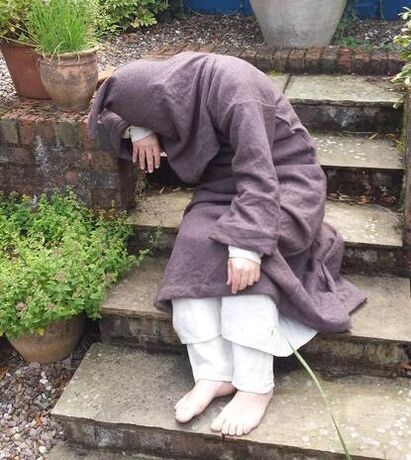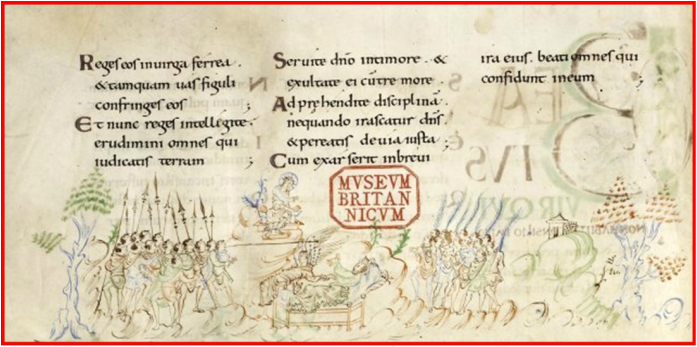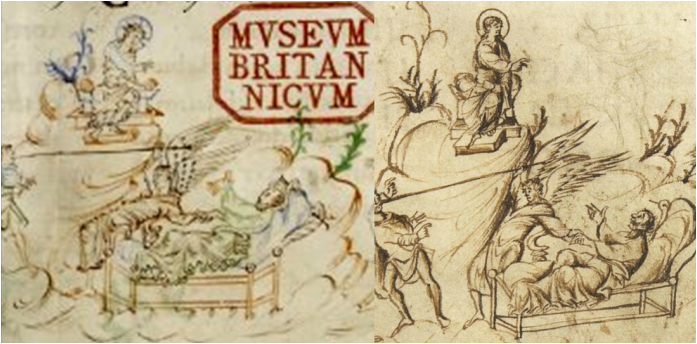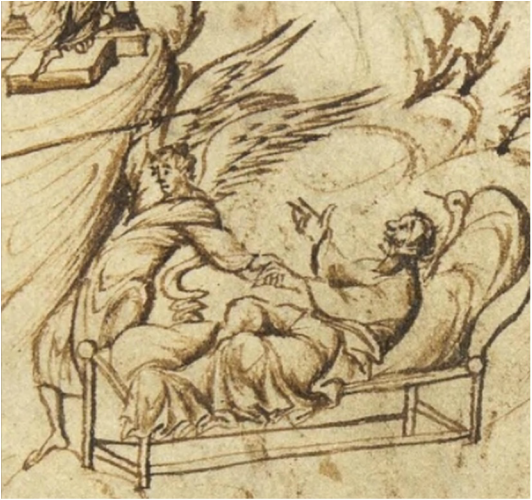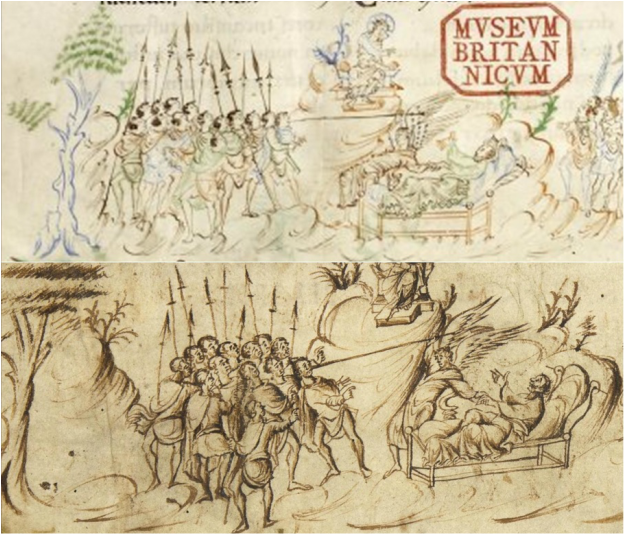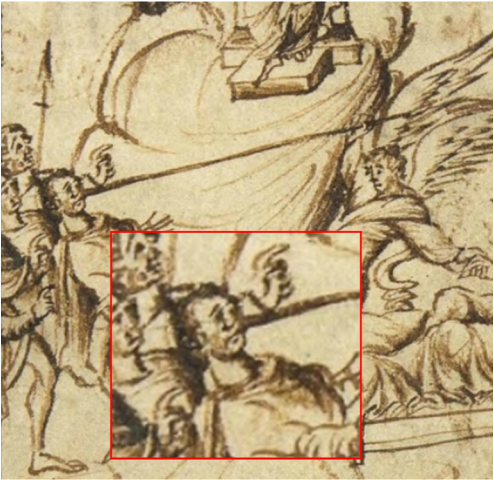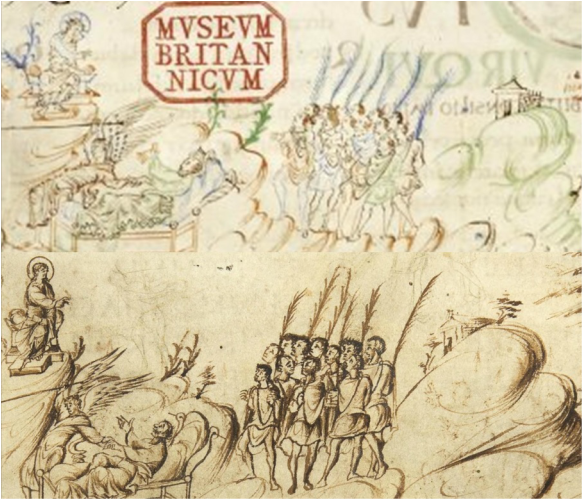|
Back with a bang, the Anglo-Saxon Monk continues his Harley Psalter guessing game. 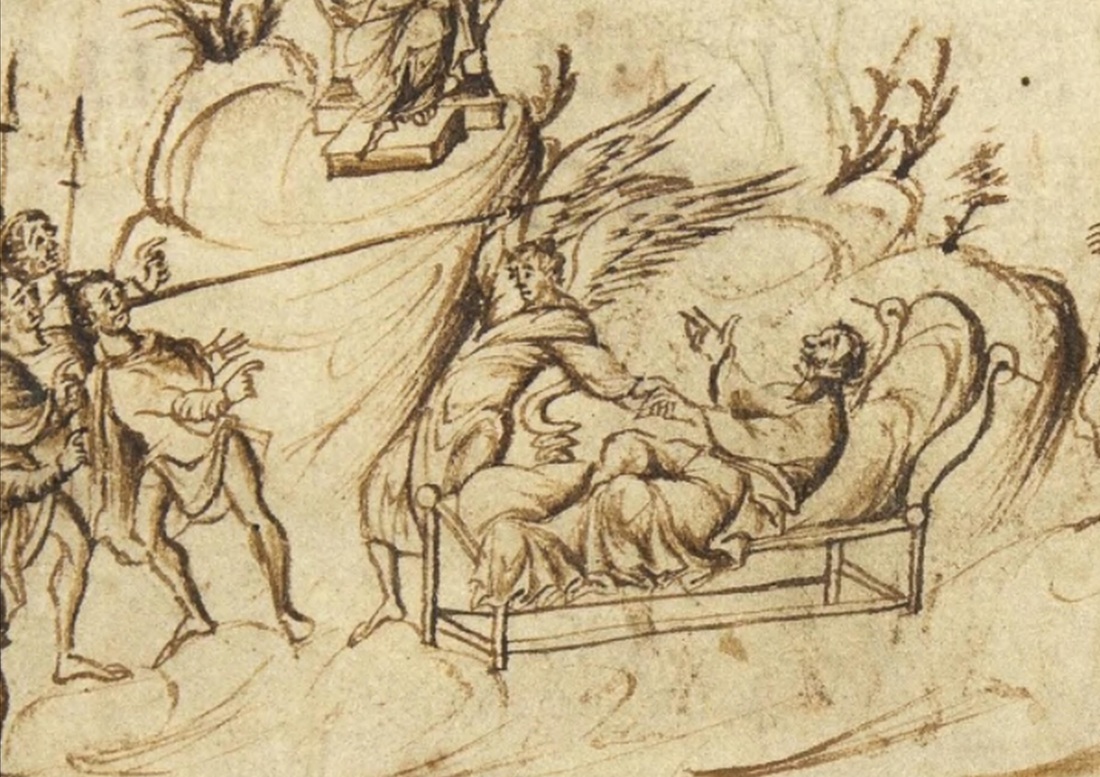 The Utrecht Psalter, Psalm 3: Utrecht, Universiteitsbibliotheek, MS Bibl. Rhenotraiectinae I Nr 32 (Rheims, c.830), folio 2v, detail. All images from the Utrecht Psalter that appear in this blog are by permission of the Utrecht Library. Please click on the image to go to the online digital facsimile. Blessed children, How can I have been so neglectful? More than a month has passed since I sent you my last spiritual missive via this blog, and I can only beg your forgiveness, et cetera, et cetera. Well, to show you the depths of my repentant heart, I thought it most appropriate to plunder the well of my spiritual waters and bring you the third in my on-going series of Harley Psalter charades. Nothing quite like an insightful gamble through the Psalms, now is there, beloved? For those of you who have not managed to keep abreast of all things charades, I will refrain from publicly shaming you and merely offer you a reminder of what it's all about. Now pay attention: The eleventh-century Harley Psalter is an English copy of the Carolingian Utrecht Psalter, produced in the ninth century. Each of the Psalms in these great manuscripts is cleverly illustrated by focusing on individual words or phrases that appear in the text. So what you see is not 'narrative art', in the traditional sense, where a story unfolds visually (by way of example, you might think of illustrated scenes from the Old Testament in medieval manuscripts, or your own modern comic strips), but rather you get to participate in the artist's game of 'which-bit-am-I?' Hence, the art historian William Noel coined the phrase ‘medieval charades’, which is what you're about to play now. Oh yes you are! 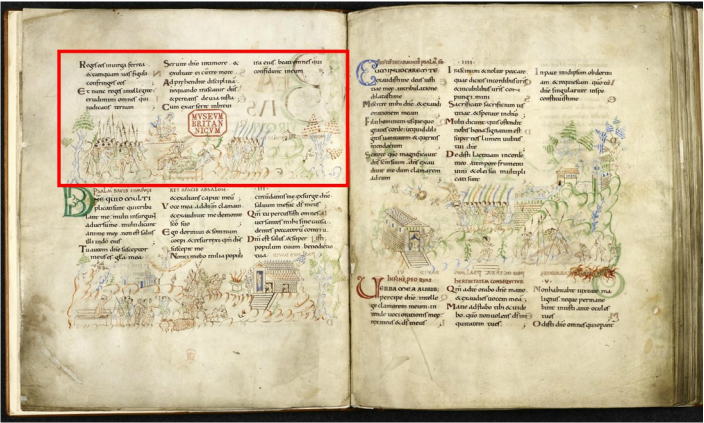 The Harley Psalter, Psalms 3-5: London, British Library, Harley 603 (Christ Church, Canterbury, first half of 11th century), folios 2v-3r. Image PUBLIC DOMAIN. All images of the Harley Psalter in this blog post are reproduced from the British Library's Catalogue of Illuminated Manuscripts. Click on this image to go to this source. So here we have the open-book image of the Harley Psalter where sits Psalm 3, the focus of today's medieval charades. And no, blessed ones, the red square therein is by my own hand, not the original rubricator's, and serves only to highlight the relevant part. If you think that is an act of wanton digital defacing, well, just look at the British Library mark, which is stamped directly on the vellum! Now as the British Library's image of Psalm 3 in its Catalogue of Illuminated Manuscripts is not as sharp as most of its other images from the Harley Psalter, I've deployed the parallel one from the Utrecht Psalter to help us out. Yes, I know, very thoughtful of me. [Please note: To see really sharp images of the Harley Psalter, you can go to the British Library's Manuscript Viewer here. Unfortunately, my monkish conscience forbids me from infringing copyright law by reproducing images from this digitized version of the Harley Psalter on my blog.] As is the custom, when beginning our medieval charades, I think we should orient ourselves with someone whom (God willing) you all recognise: the Lord! So as previous 'charadees' know well, the Lord likes to sit atop a variety of mountains (or hills) somewhere toward the top of the picture, and he wears a nimbus (a halo). Now, depending on what mood the artists were in, we sometimes get the Lord's nimbus crossed (it seems the Harley Psalter artist was having a good day), or its absentmindedly left blank (the Utrecht Psalter artist was, I would politely suggest, focusing all his creative energy on the angel below, but more on that later). So, you're all nicely oriented now, aren't you? Well, what is the Lord doing? Here, it is the Harley artist who is more helpful, for he has dropped the chin of our Lord to indicate the direction of his focus (God seems rather distracted in the Utrecht Psalter). So follow his gaze and, lo and behold, he connects with the fellow in the bed. He's listening! The Lord hath heard him. He hears us all, of course, and especially if we're lying in a bed looking all forlorn. And not only is he listening but he blesses the supine man, hence the Lord's raised right hand and two-fingered gesture. Now that was the easy bit. Let's take a closer look at our bed-ridden fellow. Now if you've been a good charades performer in the past, you should be able to work out what our man is doing with his right arm. Come on, I know you know. If I took my right hand to my mouth and then moved it with dramatic grace outwards, I would be indicating that... Yes! "It's a song", you all cry. Well, close: it's his voice. That's what God is listening to. God is hearing his voice. A speech bubble would have helped. Now for the man's left arm. As you can see, he's being taken in hand by a strapping angel. It's all a simple case of cause and effect: an angel grabs you by the hand when you're lolling in bed, and then you are miraculously lifted up, like Lazarus! Yes, the fellow has risen up. Alright, he's not exactly leaping out of bed, bracing himself for the day's persecutions, but at least he leans no more on those fat, soft pillows of his. (Don't get those in my monastery.) Let's move on. I'm hoping that you recognise the group on the left of the picture. I don't need names, just a general recognition that they're bad. Note the raised spears and those terrible, swishy, revealing tunics – always a good sign of bad folk. And there's a lot of them, many, in fact. Can you not tell that they who afflict the poor fellow in bed have multiplied? Why, it's clear to see that there are thousands surrounding him. What a nasty bunch they are disturbing him like that: there are at least three of them pointing their fingers at him. Ghastly! But let us not fear: the Lord doth protect! Just look at that powerful angel again. Yes, he's having a bit of trouble keeping his balance in the Harley Psalter, but he is majestic in the Utrecht. Intimidating! And if you want to know his methods, just look a little closer at our next clue. Bang! What a hit! Yes, this most forthright of God's messengers (God doesn't do this kind of work himself) is adept with the big stick. And what is the best place to go for when protecting a servant of God from his thousands of sinful enemies? Right in the mouth! In the teeth to be more precise. Yes, God (via his angel) has broken the teeth of this particular representative of this disreputable rabble. Looks like his upper left incisors and canine, I would suggest, and maybe his two pre-molars too. Now, blessed ones, I would hate to leave you with the impression that I'm advocating violence in dealing with naughty folk. Far from it. And to prove that, I suggest now we focus on the final element of our medieval charades. It's the happy ending: And what could be happier than waving martyrs' palm branches in the air? They look happy don't they? Especially those in the Harley Psalter: why, they have blue palm fronds – what a treat! And in both manuscripts it is clear they all share the little house on the hill in the background and, moreover, they're happy because they are good. Just ignore their skimpy tunics; well, at least they're not as swishy as those of the sinful spear-wielders. And behold! The Lord's blessing is upon his people. So it wasn't the man in the bed who got the two-fingered gesture, after all. What? This charades business is so confusing!
Now be good, blessed readers, and read through Psalm 3 below, and memorise it. If I have to, you have to. Key charade words and phrases are underlined: Psalm 3: 1 The psalm of David when he fled from the face of his son Absalom. [2 Kings 15:14]. 2 Why, O Lord, are they multiplied that afflict me? Many are they who rise up against me. 3 Many say to my soul: There is no salvation for him in his God. 4 But thou, O Lord, art my protector, my glory, and the lifter up of my head. 5 I have cried to the Lord with my voice: and he hath heard me from his holy hill. 6 I have slept and have taken my rest: and I have risen up, because the Lord hath protected me. 7 I will not fear thousands of the people, surrounding me: arise, O Lord; save me, O my God. 8 For thou hast struck all them who are my adversaries without cause: thou hast broken the teeth of sinners. 9 Salvation is of the Lord: and thy blessing is upon thy people.
5 Comments
The Anglo-Saxon Monk
19/2/2016 07:01:04 pm
May you be blessed for leaving kind words. I'm very slowly working my way through both manuscripts. I'm not sure which is my favourite. I love the detail of the original Carolingian Utrecht, but admire the liveliness of the Anglo-Saxon Harley. I think there is huge potential for using them as a resource for early medieval cultural history.
Reply
3/11/2017 01:53:00 am
I know this sounds impossible and not believable, but I believe that we all have our guardian angels. We may not see them, but I know that they are always by our side. When my brother was a baby, my father said that he left my brother in a swing that is used to help babies fall asleep. He left him for just a short moment to get something from the living room. When he came back, he found my brother sleeping on the floor peacefully. They believe that his guardian angel caught him when he fell from the swing.
Deborah
20/2/2016 04:34:26 am
okay, that was fun, I guess that I should start at the beginning charade...
Reply
Your comment will be posted after it is approved.
Leave a Reply. |
Details
|

